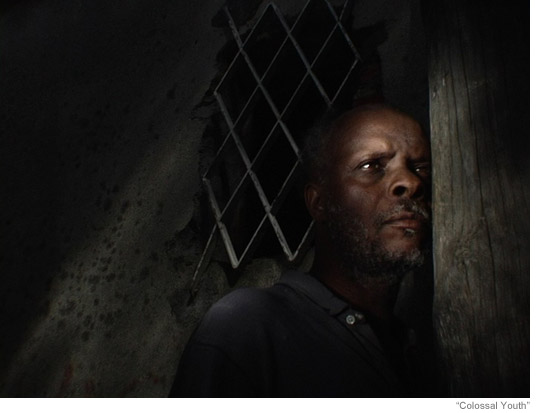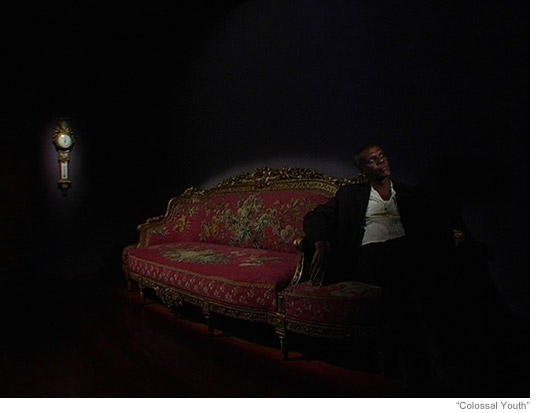|
| 1 | 2 | 3 | 4 | 5 | |
 Can we go further into how you deal with space, about this small universe, this limited space you created?
Can we go further into how you deal with space, about this small universe, this limited space you created?
Well, in this film, it was difficult, but at the same time, that was challenging was, they were moving from one place to another in the real universe. They left one universe, the old place, the old houses, the old streets, and it also means light, and so many things. Space, time. If you are in a certain space, you are in a certain time, they move to this completely different white space, where they are forced to live there forever. And this happens more or less in the beginning of the film. The film started. And they were moving. And I started to move with them. I think it was a very good thing for the film because my idea, my observation of that space was the same as theirs, their time. They looked at the space and I looked at the same space in time. They were the actor and I was the director and we both looked at our set (laugh) in the same way. And the same way was as problematic. For them, how are we going to live here? For me, how was I going to shoot this? It's all white. It's very difficult for me on video. It's everything you should not do. Complete white surfaces. They are black. So it's difficult to have light, to treat light. So we had this common ground, problem, and it was very useful for the film because it was a criticism about the space, as it was their criticism about the space at the same time. It is not cosy. It's not like it used to be, especially. I did not make this space. This was made for me. It's very important for these guys, all of them. 90% of them are cycle immigrants, all over the universe, they are builders, they build tables, houses. People have to build things because they have no money, almost from scraps. And for the first time, everything was brought to them. They had houses made by strangers. Who made this? The people who made this do not know me, so I do not want this kind of house. It's good. There's water, locks, toilets, it's functional, it's perfect, but something is not quite right. And what's not right is that they they realized the space they had built was gone forever, and they will not have the chance of building anything again. That's a very complex idea but I think they understood that. We are becoming a part of society. Really marginal part, we are still poor, we are still down and under, but we are inside society now. They have locks, and we have a shot of a guy opening a door. They never opened doors, at least before. And I do not remember a key. Never. An idea of a key was nonexistent. In Fontainhas, the public space and private space was undetermined. Like you see from this room, a room could be square, and a street could be very mysterious, as well as a house, a corridor, so the old space was very interesting, like a village. It's exactly like the old system of an old African village, maybe an old Japanese village, from the way the space was built. And now they have other problems, they have city problems where they still can't identifiy. They are lost. And I was lost too, during the shooting of the film. So I had to deal with a lot of problems, but at the same time, it was useful for the film.
So in your later short films, you deal with what they had gone through, like Tarrafal?
Yes. What was interesting in that film Tarrafal was, small things we had to do. And they were already moving here, and I arrived and got a phone call from this foundation that wanted to fund the film. For 15 minutes. So let's do something. Let's think of something. So it started, let's think of something, me, Ventura, and this other guy. And one or two days later, they said please, let's not make a film here again. So let's make it somewhere else. I said, but yes, this is where you live now. But yes, we made Colossal Youth about that, this small film we can do it somewhere else. And I understood that they were all a bit fed up already with that place. But where was my problem? Everything we imagine has to do with you, so it would have to do with your space also. So they said, okay, it's very simple, let's just cross the speedway. There's a speedway all around the place. Let's go down and let's go somewhere around there, and we went just across the speedway, and spent two or three weeks there, in this kind of small woods, with small trees, two rocks, and everything was done there, it was this no man's land, like a forest. And I understood that they even lost their space, so if we make films, that's going to be difficult because they have also to invent a new space they like. Within the film. Because in real life, they are forced to live there. In the film, they would probably like to invent a new space. And that new space would be a strange space. A very simple space or a very natural space, under a tree or something. So it's beginning to be like you say, to be like god speaking, like in heaven.
 Where does myth enter?
Where does myth enter?
It's already there. It has always been there. We don't think about it. I don't think about that, but it's there, of course, at least. I mean, we need to take myth back to human beings. Myth was taken from us. And we have to get it back to us. I mean, myth was stolen by money and bosses, and it was born, simple people thought of things, and thought of ways of telling things in some very wonderful ways, and that was myth, legend but there was a connection with people that told the story, simply because they told it to young guys, their children, from grandfather to son, and that was the origin of myth and origin of community. And one day, I think it was stolen when another class was born, a social class, because one day on this planet, there were only human beings working on the land and making things, and one day a guy thought, oh, I can make money from them. And mythology became something that we could say was the voice of the gods. But now the gods were commanding and ordering things. They were not generous. They were bosses. So I feel that there are not enough mythologies in the world. Common people lost mythology. Or mythology is made, probably, in the SONY building here, or their brothers in Los Angeles. Things like those places that fabricate mythology today.
And video games.
Absolutely. They are around us somewhere. (laugh) In high places. So we have to bring it down. It's like using Panasonic. I use Panasonic. It's okay, it's a good machine. It's a good tool. But I will not do what it tells me to do. What they are telling me to do is to move it very fast, to turn it around and use it quickly, and I'm trying to use it very slowly. Take time, so you have to be against everything you're told to do, but yes, we have to reinstall, bring back some mythology, or at least to the common people, and I still know some common people, they exist and they art not so hidden and not so weak. I have a lot of confidence in them. I'm trying to help them.
Absolutely. They are around us somewhere. (laugh) In high places. So we have to bring it down. It's like using Panasonic. I use Panasonic. It's okay, it's a good machine. It's a good tool. But I will not do what it tells me to do. What they are telling me to do is to move it very fast, to turn it around and use it quickly, and I'm trying to use it very slowly. Take time, so you have to be against everything you're told to do, but yes, we have to reinstall, bring back some mythology, or at least to the common people, and I still know some common people, they exist and they art not so hidden and not so weak. I have a lot of confidence in them. I'm trying to help them.
| 1 | 2 | 3 | 4 | 5 | |
